Content
- 1 Watermelon is a fruit or a berry
- 2 Composition and calorie content of watermelon
- 3 Useful properties of watermelon
- 4 Is watermelon possible for children and at what age
- 5 Can a watermelon be pregnant
- 6 Watermelon breastfeeding
- 7 Watermelon for diabetes
- 8 The benefits of watermelon peel
- 9 The benefits and harms of watermelon seeds
- 10 Watermelon oil: benefits and harms
- 11 How to choose the right watermelon
- 12 Watermelon harm and contraindications
- 13 How to check watermelon for nitrates at home
- 14 Conclusion
Juicy ripe watermelons appear in stores and markets towards the end of summer. The benefits and harms of watermelon are due to its chemical composition, in addition to the refreshing taste, it has other advantages.
Watermelon is a fruit or a berry
When you look at a large and heavy watermelon, it does not even occur to you to call it a berry - after all, this word is usually associated with small fruits. And, nevertheless, from the point of view of botany, watermelon belongs to the melon culture and the Pumpkin family. This means that the plant itself is a vegetable, and its fruits fall into the category of berries, despite the size.
Composition and calorie content of watermelon
The fruit has a very low nutritional value. The calorie content of watermelon per 100 grams is no more than 38 calories, and this is not surprising - it is 92% water. In addition to water, it includes:
- carbohydrates - about 11% of disaccharides and monosaccharides;
- proteins - up to 0.9% of the volume;
- fructose, glucose and sucrose;
- elements important for the body - nickel, iron, manganese, magnesium and potassium;
- vegetable fiber;
- pectin substance;
- fatty acid.
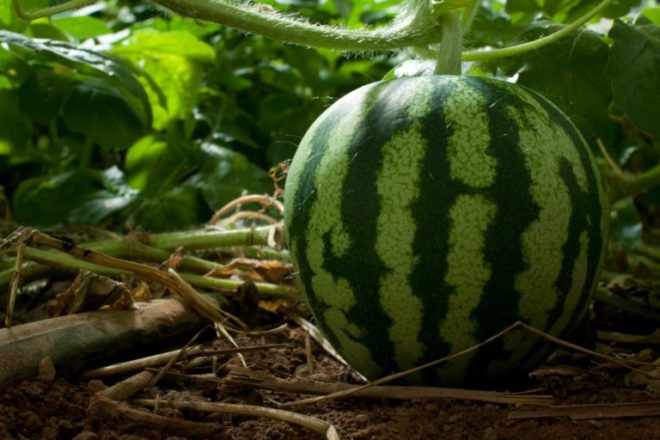
What vitamins are in watermelon
The vitamin composition of watermelon deserves special attention. The huge berry contains a full supply of the vitamins the body needs most, namely:
- groups B - B1, B2, B3, as well as B6 and B9;
- FROM;
- E;
- AND;
- D.
The percentage distribution of vitamins in the composition largely depends on how the fruit was grown. The most useful are berries that grow outdoors in natural conditions and are not exposed to chemical additives.
Useful properties of watermelon
The vitamin and mineral composition of watermelon is a complex benefit for the whole body as a whole. The substances in the berry strengthen the blood vessels and the heart system, have a beneficial effect on the skin and hair. However, watermelon is generally prized for:
- is a strong diuretic - which means it helps to quickly get rid of edema and cleanse the body of toxins;
- perfectly quenches thirst and eliminates the feeling of hunger - therefore ideal for hot weather;
- stimulates peristalsis thanks to the fiber in its composition - with the help of watermelon, you can fight the tendency to constipation.
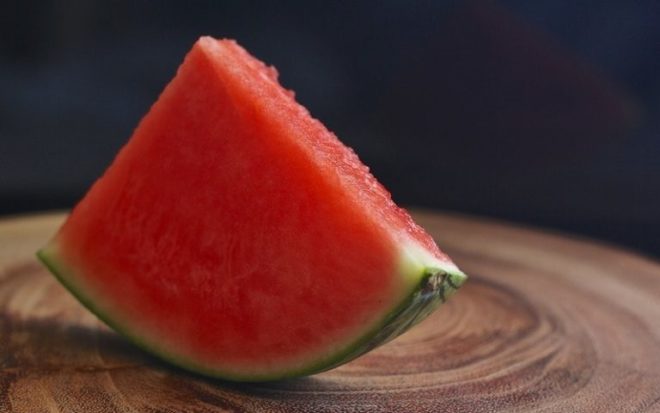
It must be remembered that it is better to eat the berry separately from other products. Otherwise, the fermentation process may start in the intestines, which will lead to disorder.
Benefits of watermelon for women
For women, the berry is especially useful. First of all, watermelon is effective for edema - it is women who are most prone to them. Also, a large berry gently evens out hormones, improves the condition of the skin and hair.
The benefits of watermelon for men
The diuretic properties of watermelon will benefit men who are prone to prostate tumors and inflammation. In addition, melon berries are recommended for use after workouts and heavy physical exertion - to replenish the body's fluid and nutrient reserves. Watermelon can be eaten with a hangover - it helps restore the water-salt balance.
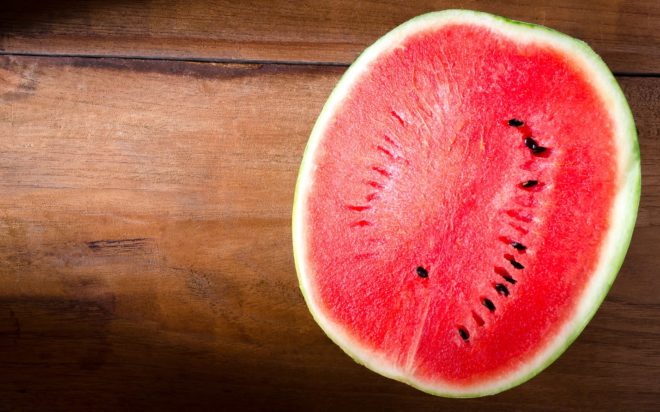
The benefits of watermelon for weight loss
Watermelon contains very few calories and a lot of water, so the product is ideal for any diet. The berry activates the kidneys, and excess weight goes away very rapidly, besides, toxins are removed from the body.
True, it must be remembered that due to watermelon, the body loses mainly excess fluid. For weight loss to be long-term, it is necessary to focus on exercise and normalization of the entire diet.
Is watermelon possible for children and at what age
The child can be given a watermelon - the vitamin berry will strengthen the baby's health. But there are nuances.

First of all, for the first time it is necessary to offer the product to a child only after 1 year and in small quantities to make sure that there is no allergy. First, it is necessary to remove seeds from the pulp so that the child does not choke on them. It is also worth making sure that the berry is of high quality and natural, and that no nitrates were used in its cultivation.
Can a watermelon be pregnant
Women in a position to consume melons and gourds can, if not exceed the usual daily intake for adults. Vitamins and trace elements are very valuable for the expectant mother and baby. The benefits of watermelon during pregnancy lie in the fact that it helps to cope with edema, which is almost inevitable during the period of gestation.
Watermelon breastfeeding
During lactation, the berry compensates for the lack of magnesium, iron and other valuable substances in the mother's body, stimulates the increased production of breast milk. Therefore, a nursing mother can have a watermelon, it will be beneficial. However, care must be taken to ensure that the infant does not develop allergic reactions to milk after the mother has consumed the watermelon.
Watermelon for diabetes
It is very important for diabetics to control their blood glucose levels, so regular sugar is contraindicated for them. But watermelon contains mainly vegetable fructose, which is absorbed by the body rather quickly and requires almost no additional insulin. Therefore, in small doses, diabetics will benefit from the berry.
However, with diabetes mellitus, watermelon can be eaten in an amount of no more than 40 g per day, and at the same time, you need to carefully monitor the daily amount of carbohydrates.
The benefits of watermelon peel
Valuable properties are present not only in the juicy pulp of the fruit, but also in its peel. Watermelon peel contains a large amount of vitamins and minerals, amino acids and water, therefore it can be an excellent folk remedy. In particular, the peel:
- helps with headaches of colds and migraines;
- moisturizes and tones the skin, has a slight anti-inflammatory effect;
- in the form of infusions and decoctions works well for edema and kidney disease.
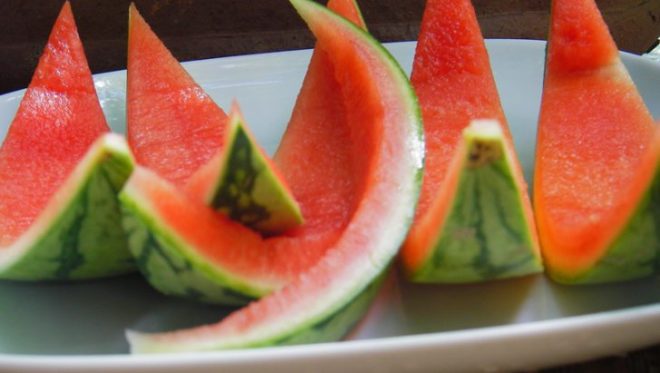
For example, in case of a headache, it is enough to take fresh watermelon peels and apply them to the temples for 15-20 minutes. And the benefit of watermelon peels for the face is that when rubbed, in the form of a mask, they cleanse the pores and moisturize the skin.
For diseases of the stomach and liver, you can prepare the following decoction:
- pour water over peeled and crushed watermelon peels;
- boil for half an hour;
- then insist another hour and strain.
You need to drink half a glass three times a day.
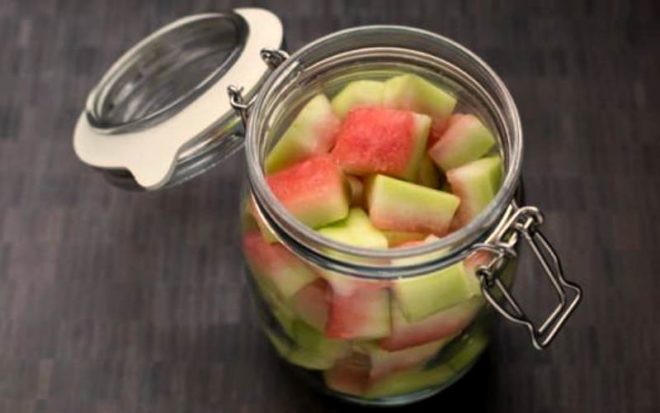
The benefits and harms of watermelon seeds
Watermelon seeds contain a lot of useful substances - protein, polyunsaturated fats, important trace elements (magnesium, iron and zinc), arginine and niacin. Therefore, their use in food:
- contributes to the normal functioning of the digestive system;
- increases immunity and strengthens hair;
- lowers cholesterol and regulates blood pressure;
- relieves chronic fatigue and depression.
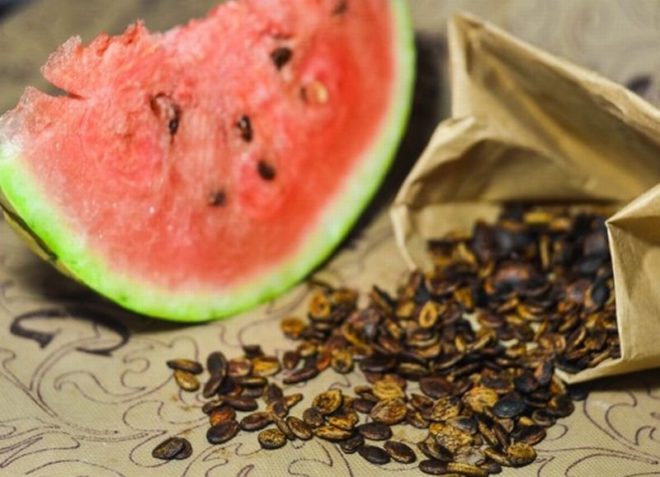
However, seeds can also be harmful. Their use is contraindicated in diseases of the kidneys and urinary system. The fact is that one of the amino acids in the process of processing releases ammonia in small doses - with these ailments, this substance is especially dangerous. Also, eating watermelon seeds is not recommended for pregnant women and lactating mothers, obese people and children under 3 years old.
The following recipes based on watermelon seeds are popular:
- Dried and crushed seeds, drenched in milk, will help get rid of worms if you drink a glass three times a day before meals.
- Half a teaspoon of fine seed powder will help reduce blood pressure when taken twice a day.
- 3 teaspoons of watermelon seed powder before meals are good for gallbladder diseases.
You should not abuse watermelon seeds - the maximum dosage is 2 tablespoons per day.
Watermelon oil: benefits and harms
Melon seeds are consumed not only fresh or dried. They are cold pressed into a healthy oil, which is widely used in cooking, home medicine and cosmetology.
The benefits of watermelon seed oil are that the product:
- serves as an effective prevention of diabetes, osteoporosis and heart ailments;
- relieves the condition with hypertension and urolithiasis;
- rejuvenates the body and increases the rate of cell renewal;
- lowers bad cholesterol;
- strengthens the nervous system;
- improves potency in men and libido in women.
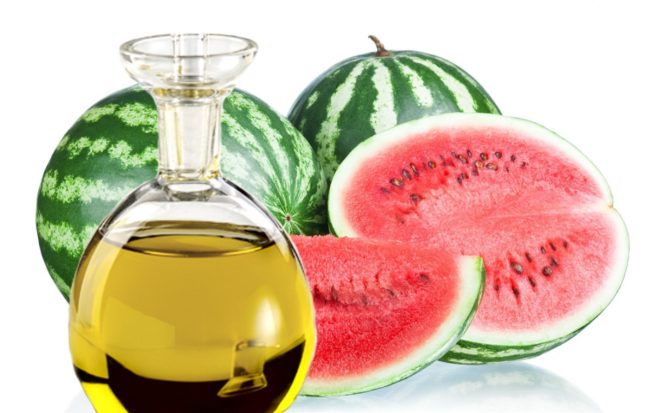
However, with allergies or overdosing, watermelon oil is harmful. Namely, it can lead to the occurrence of allergic edema and a runny nose, weaken attention and concentration, and negatively affect the condition of the kidneys.
The use of watermelon oil in cosmetology
The most widely used watermelon seed oil is used in cosmetology - it is added to lotions, masks, tonics for washing and creams. A distinctive feature of the product is that the oil is equally good for dry, oily and normal skin. It helps to quickly get rid of acne, softens and evens out the skin, cleanses the pores:
- To eliminate blackheads and acne, you can lubricate your face with watermelon oil twice a day for 3 months.
- To increase hair volume, you can apply watermelon oil to it as a mask on a weekly basis for 20 minutes - and so on for 6-8 months.
Watermelon oil is also great for adding to warm baths or using it for massage.
How to choose the right watermelon
It is not so easy to buy a ripe and healthy berry, but there are several rules that will help you not to make a mistake when choosing a watermelon:
- The best fruits are always large, from 5 kg and more.
- Ripeness is indicated by a light yellow spot on the surface of the fruit.
- When tapping, the sound from a ripe berry should be ringing, and not muffled.
- The skin of the fruit should be firm, shiny, without damage.
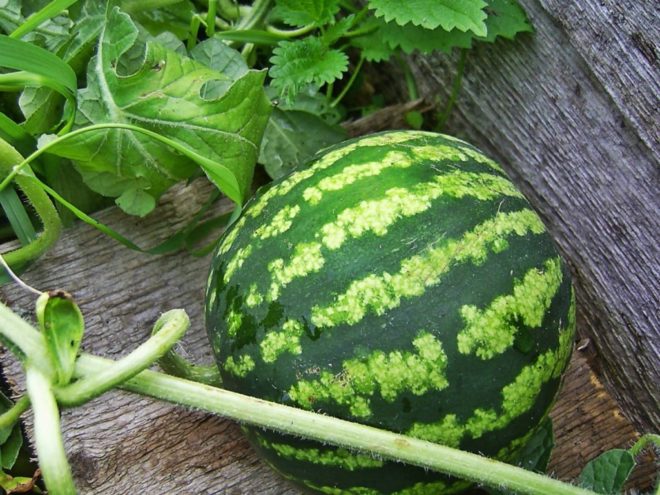
But you should not be guided by a dry "tail" - after all, the stalk could dry out simply because the watermelon was separated from the bush a few days ago. This does not guarantee ripeness at all.
Watermelon harm and contraindications
For all its benefits, melon berries have some contraindications. It is impossible to eat them and treat them with watermelon:
- with colitis and disorders of the urinary process;
- with hard stones in the gallbladder and kidneys;
- with acute diarrhea or vomiting.
How to check watermelon for nitrates at home
Only natural watermelons, grown without the use of chemicals, bring health benefits. And you won't be able to check the berries for nitrates right in the store without special equipment. However, you can do this at home - before eating the watermelon:
- When fully immersed in water, the natural fruit should float to the surface. The berry, loaded with chemicals, will sink to the bottom.
- If you soak a piece of natural watermelon in water for half an hour, the water will only become cloudy. If it acquires a bright pink or red color, then the watermelon is saturated with nitrates.
- A cut can tell a lot about the naturalness of a watermelon - if nitrates were used during cultivation, then the flesh will be permeated with large whitish or yellowish veins.
- You can examine a cut of a watermelon in bright light - with a large amount of nitrates, the surface will take on a slightly purple hue.
Conclusion
The benefits and harms of watermelon are primarily due to the naturalness of this berry - a good berry should not contain chemical growth accelerators. It is also important not to consume the product in too large quantities - this will overload the kidneys in the first place. But a natural, environmentally friendly watermelon, subject to the measure and the absence of contraindications, will positively affect all body systems.

